On monochlorination of n-pentane, the number of isomers formed is:
(1) 4
(2) 3
(3) 2
(4) 1
n-पेन्टेन के मोनोक्लोरीनीकरण पर, निर्मित होने वाले समावयवियों की संख्या है:
1. 4
2. 3
3. 2
4. 1
Which of the following acids shows stereoisomerism?
(1) Oxalic acid
(2) Tartaric acid
(3) Acetic acid
(4) Formic acid
निम्नलिखित में से कौन सा अम्ल त्रिविम समावयवता को दर्शाता है?
1. ऑक्सैलिक अम्ल
2. टार्टरिक अम्ल
3. एसीटिक अम्ल
4. फॉर्मिक अम्ल
The maximum number of stereoisomers possible for 3-hydroxy-2-methyl butanoic acid is:
1. 1 2. 2
3. 3 4. 4
3-हाइड्रॉक्सी-2-मेथिल ब्यूटेनॉइक अम्ल के लिए संभव अधिकतम त्रिविम समावयवियों की संख्या है:
1. 1 2. 2
3. 3 4. 4
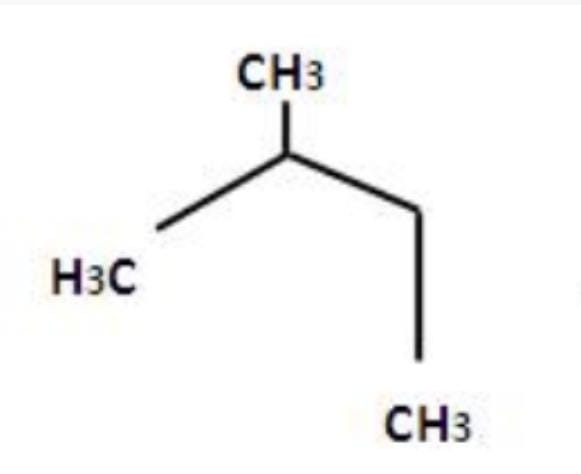
what are the no. of N and M?
(1) 6, 6
(2) 6, 4
(3) 4, 4
(4) 3, 3
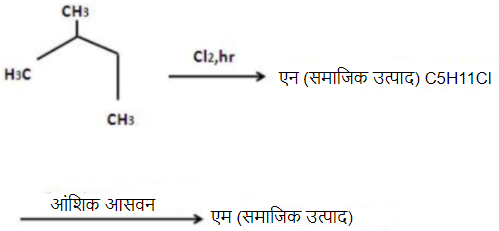
M और N की संख्या क्या है?
1. 6, 6
2. 6, 4
3. 4, 4
4. 3, 3
Which of the following pairs are enantiomers?
1. 
2. 
3. 
4. 
निम्नलिखित में से कौन-सा युग्म प्रतिबिंबी समावयवी हैं?
1. 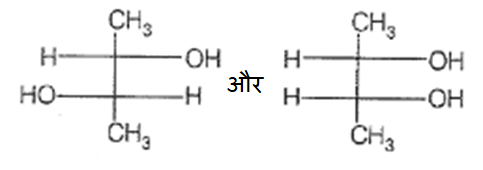
2. 
3. 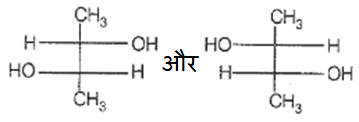
4. 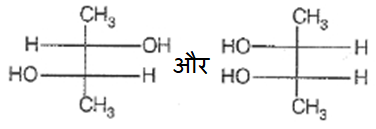
Identify the structure of x,
(1)
(2)
(3)
(4)
x की संरचना की पहचान कीजिए-
(1)
(2)
(3)
(4)
The IUPAC name of the compound CH3CONH(Br) is:
1. 1-bromoacetamide
2. N-bromoethanamide
3. Ethanoyl bromide
4. None of these
यौगिक CH3CONH(Br) का IUPAC नाम है:
1. 1-ब्रोमोएसीटेमाइड 2. N-ब्रोमोएथेनामाइड
3. एथनॉयल ब्रोमाइड 4. इनमें से कोई नहीं
Which of the following contains only three pairs of electrons?
(1) Carbocation
(2) Carbanion
(3) Free radical
(4) None of these
निम्नलिखित में से किसमें केवल तीन इलेक्ट्रॉन युग्म होते हैं?
1. कार्बधनायन
2. कार्बऋणायन
3. मुक्त मूलक
4. इनमें से कोई नहीं
The correct order of basicities of the following compounds is:
1. 2>1>3>4 2. 1>3>2>4
3. 3>1>2>4 4. 1>2>3>4
निम्नलिखित यौगिकों की क्षारीयता का सही क्रम है:
1. 2>1>3>4 2. 1>3>2>4
3. 3>1>2>4 4. 1>2>3>4
IUPAC name of the compound, 
1. 1-chloro-2,3-epoxypropane
2. 3-chloro-1,2-epoxypropane
3. 1-chloroethoxymethane
4. none of the above
यौगिक,
1. 1-क्लोरो-2, 3-इपॉक्सीप्रोपेन
2. 3-क्लोरो-1, 2-इपॉक्सीप्रोपेन
3. 1-क्लोरोएथॉक्सीमेथेन
4. उपरोक्त में से कोई नहीं












